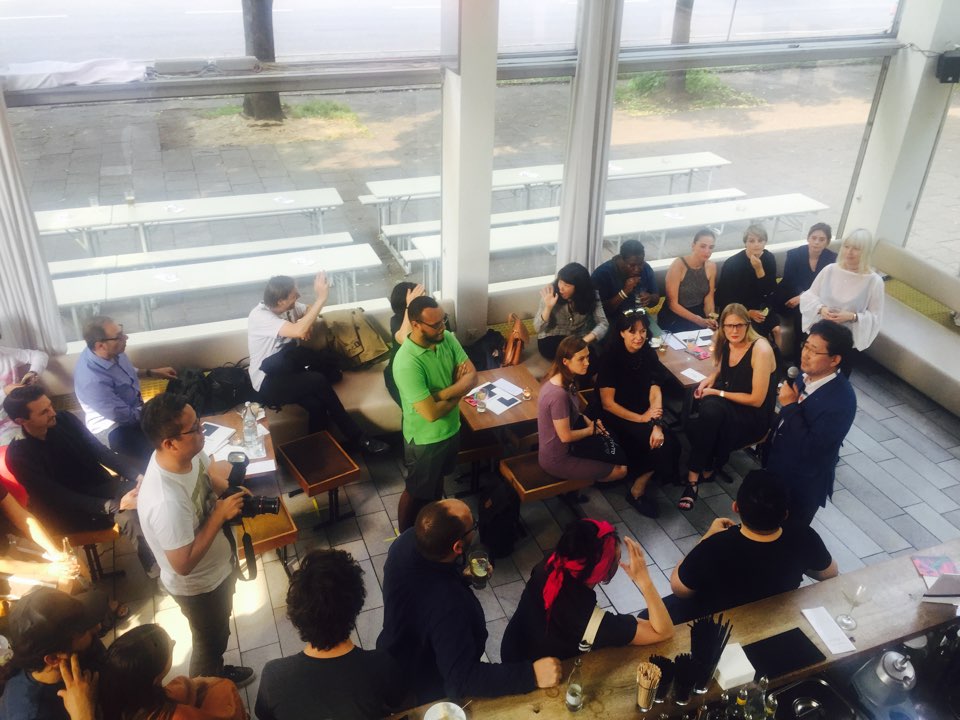Press
Resource Center

With dates in accordance with the Berlin Biennale, the 2016 Gwangju Biennale which will open in September held a welcoming and informative reception in Berlin, a city known for being one of the world’s leading art center.
On the afternoon of June 2nd at the Kosmetiksalon Babette, the Gwangju Biennale Foundation hosted this reception represented by the President Yangwoo Park, artistic director Maria Lind along with some members of the curatorial team, and the staff members of the Gwangju Biennale Foundation.
Many art professionals such as Elke aus dem Moore, Director of IFA; Barbara Trojanowska and Ewa Borysiewicz, Visual Arts Producer and expert at Adam Mickiewicz Institute; Francesca Bertolotti-Bailey, Head of Production and International Projects at Liverpool Biennial; Goncalo Seno, Co-founder of the ATLAS Projectos; Gregory Castera, Director of Council Curatorial Platform, Jan Edler, Founder of the Realities:United as well as Gwangju Folly III participant; Jude Chambers, Project Director of Creative New Zealand; Judith Greer, Director of International Programmes of Sharjah Biennial; Prem Krishnamurthy, Co-Founder of Projects Projects; Sabine Vogel, Frankfurt Algemeine Zeitung; Saehoon Kwon, Director of Korean Cultural Center in Berlin; Sheikha Hoor Al Qasimi, President of Sharjah Biennial; as well as this year’s participating artists Agnieszka Polska, Ahmet Ogut, Katie Paterson, Nadia Belerique, Natascha Sadr Haghghigan, Pauline Boudry, Ruth Buchanan and Trevor Paglen assembled for this international gathering.
The reception proceeded with President Yangwoo Park delivering the welcoming remarks followed by greeting and introduction of the curatorial team from the artistic director Maria Lind who continued with a description of the 11th edition of the Gwangju Biennale, the participating artists, and the structural explanation of this year’s exhibition.
In his welcoming speech, President Park referred back to the historical origin of Gwangju Biennale, the 1980s Gwangju Democratization Movement. Citizens revolting against military dictatorship exemplified the spirit of community, democracy, humanity, and outcry for peace which sublimed into visual arts and culture, in turn becoming the first edition of the Gwangju Biennale in 1995. And after twenty years of successfully concluding 10 editions of the biennale, Gwangju Biennale was able to rank in the World’s top 5 Biennials. The President also announced that this year’s biennale will be differentiated from all the past editions of the Gwangju Biennale and certainly from other Biennials in the world through development and collaboration that has not been attempted before.
The 2016 Gwangju Biennale will be held from September 2nd through November 6th under the title The Eighth Climate (What does art do?). The venues for this 11th edition of Gwangju Biennale includes the Gwangju Biennale Exhibition Hall, Asia Culture Center, May 18 Archives, Mudeung Museum of Contemporary Art, Uijae Art Museum, Wool Jaeghil Art Museum and Mite-Ugro. A total of 119 participating artists from 37 different countries will present productions varying from media, installation, panel and performances centering on the process, investigation, and mediation.